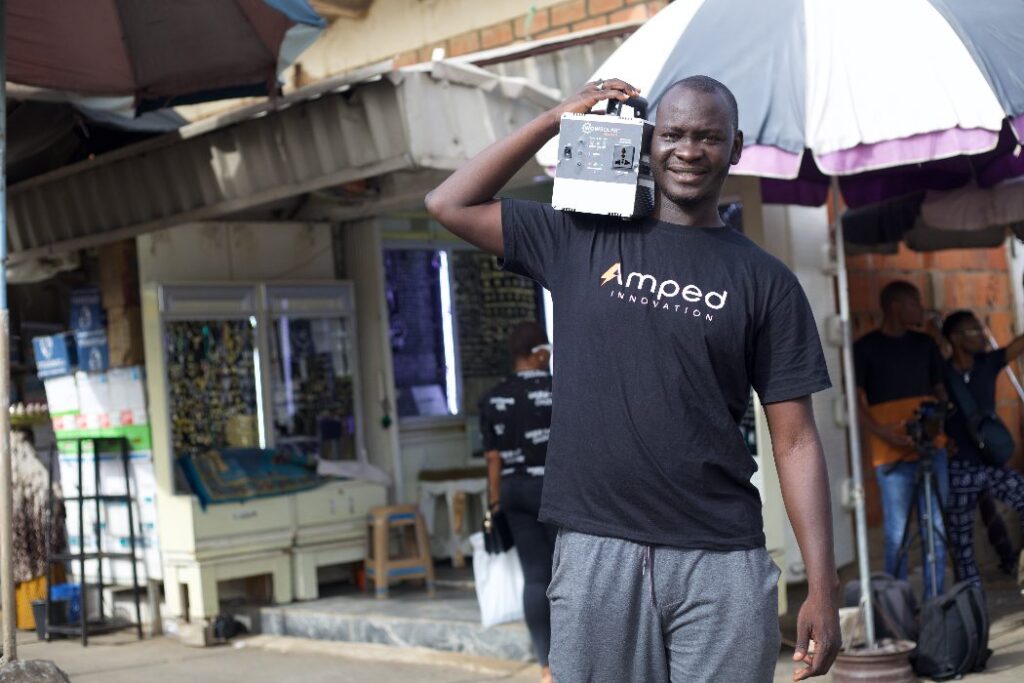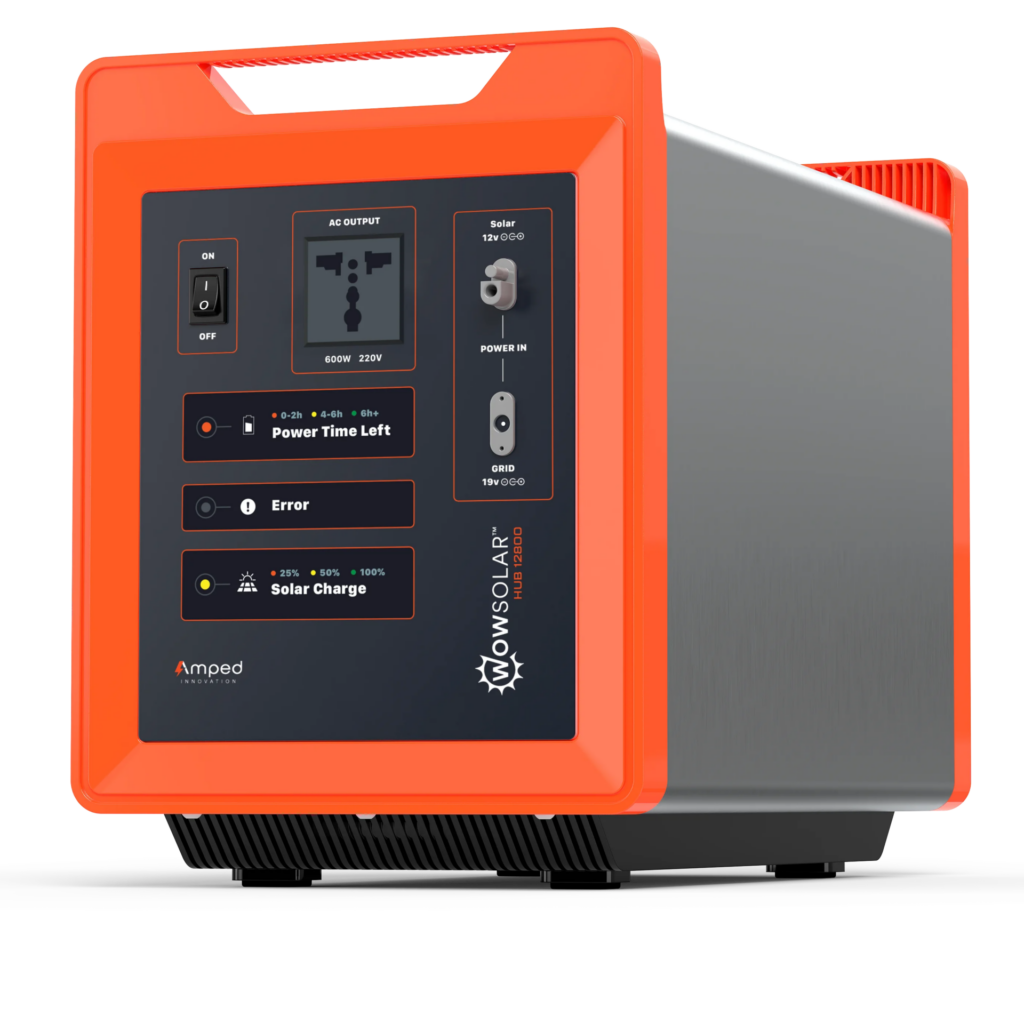The E4C Fellowships, sponsored by Engineering for Change, empower early-career engineers and other technical professionals worldwide to work on local and global sustainable development challenges while building professional skills and relationships. The Autodesk Foundation supports up to 30 E4C Fellows, who will commit five months to working for portfolio organizations on Design for Good, Advancing Workflows, and Impact Research projects. E4C Fellows work remotely with flexible schedules during both summer and winter cohorts. This story is part of an ongoing series profiling several Autodesk Foundation-supported E4C Fellows.

In Nigeria, 165 million people—well over half the 2023 estimated population of 220 million—live with less than six hours of electrical grid power per day, according to Amped Innovation, a social enterprise in the Autodesk Foundation Health & Resilience portfolio that creates access to off-grid solutions for last-mile communities. Currently, the best alternative to grid power for households and businesses are fuel generators, which are noisy and polluting.
The problem is that the dirty and noisy fossil fuel generators only cost about $200, compared to around $1,200 for a quiet and clean solar-charged battery generator, according to Amped Innovation co-CEO and co-founder Kurt Kuhlmann. “It’s a classic debt trap,” he wrote in a column for CleanTechnica. “Lack of productive power keeps people from being able to afford productive power.”
As an organization, Amped Innovation has the goal of de-carbonizing the grid in Nigeria and other sub-Saharan African countries by 2030, which would require replacing at least 3 million fuel generators per year in Nigeria with a sustainable alternative. That’s why Amped Innovation purpose-builds its WOWsolar generators, as well as other appliances, for sub-Saharan Africa’s climate and customer needs.
Besides needing more affordable options for clean-powered generators, many African users need to run their generators for several hours every day at their highest power output, often in dusty, hot conditions. Mainstream cobalt lithium-ion batteries, however, are not ideal for any of those needs. Instead, Amped Innovation builds its solar generators, including the upcoming WOWsolar Hub 6400 and Hub 12800, with LiFePO4 (lithium iron phosphate) batteries. The LiFePO4 batteries are heavier and more expensive than Li-ion but can handle heavier use without fatiguing and are safe to run hot for extended periods. Amped Innovation’s generators also need to have sealed enclosures to be dust-proof, so they use large external heat sinks rather than fans for cooling.
Customer perspectives on solar generators

Despite the advantages of Amped Innovation’s solar-based inverter and power bank systems over fossil-fuel generators, the company had a problem with customer acceptance in Nigeria. This problem was an ideal fit for an Engineering for Change (E4C) Summer Fellowship. Amped Innovation’s 2022 E4C Fellow, mechanical engineer Alex Inoma, worked on customer research and product information materials that would inform the go-to-market strategy for Amped Innovation’s new Hub 6400 and Hub 12800 solar generators with the goal of breaking through the barriers to user acceptance in Nigeria.
“A major barrier is ‘cost vs. quality,’” Inoma says. “Most high-quality systems are financially out-of-reach of the average consumer, which deters some people from purchasing these clean-energy products. Meanwhile, more affordable systems end up being of low quality and capacity.”
Inoma says Amped has mitigated those concerns by producing high-quality solar generators that are both affordable through PayGo installment payments integrated into the WOWsolar power hubs, and easily field-repairable. The typical daily use of its solar generators costs less than the fuel typically needed for equivalent fuel generator use, so the company says they pay for themselves in fuel cost savings after 9-12 months.
Sending the message of solar power banks
Inoma points to another barrier to customer acceptance in Nigeria: ambiguous product information that fails to convey the benefits of Amped Innovation’s photovoltaic (PV) inverter and power bank systems compared to traditional fuel generators. So Inoma was tasked with creating a variety of product spec sheets, sales sheets, and guides that better communicated the message. During his customer research that was to inform these documents, Inoma says that “interviews and surveys don’t always produce the results the research team anticipated. It is very important to approach interviews with an open mind.”
To incorporate his customer research findings into documents that convey Amped Innovation’s solar generator benefits, they needed to be visually based and easily comprehensible using locally accepted terminology. Inoma, who had previously worked with Autodesk partner Generative CAD Services, used Autodesk Fusion 360 to develop photo-realistic renderings of the products and to depict their usage in the field. This visual strategy of communication and Inoma’s customer research are now helping to inform Amped Innovation’s go-to-market strategy for its upcoming solar generators in Nigeria.
The E4C Fellowship also succeeded in broadening Inoma’s knowledge and experience in engineering for sustainable development. He now works on a spin-off of his undergraduate thesis called Peoples Mobility in Nigeria. This startup is developing an electric drive unit add-on that can convert any manual wheelchair into a powered device at a fraction of the average current price of an electric wheelchair.
Applications for the 2023 E4C Summer Fellowship are open until February 12, 2023. See and apply for the projects available in the 2023 Summer Cohort, or learn about the ongoing Winter and Summer cohorts.